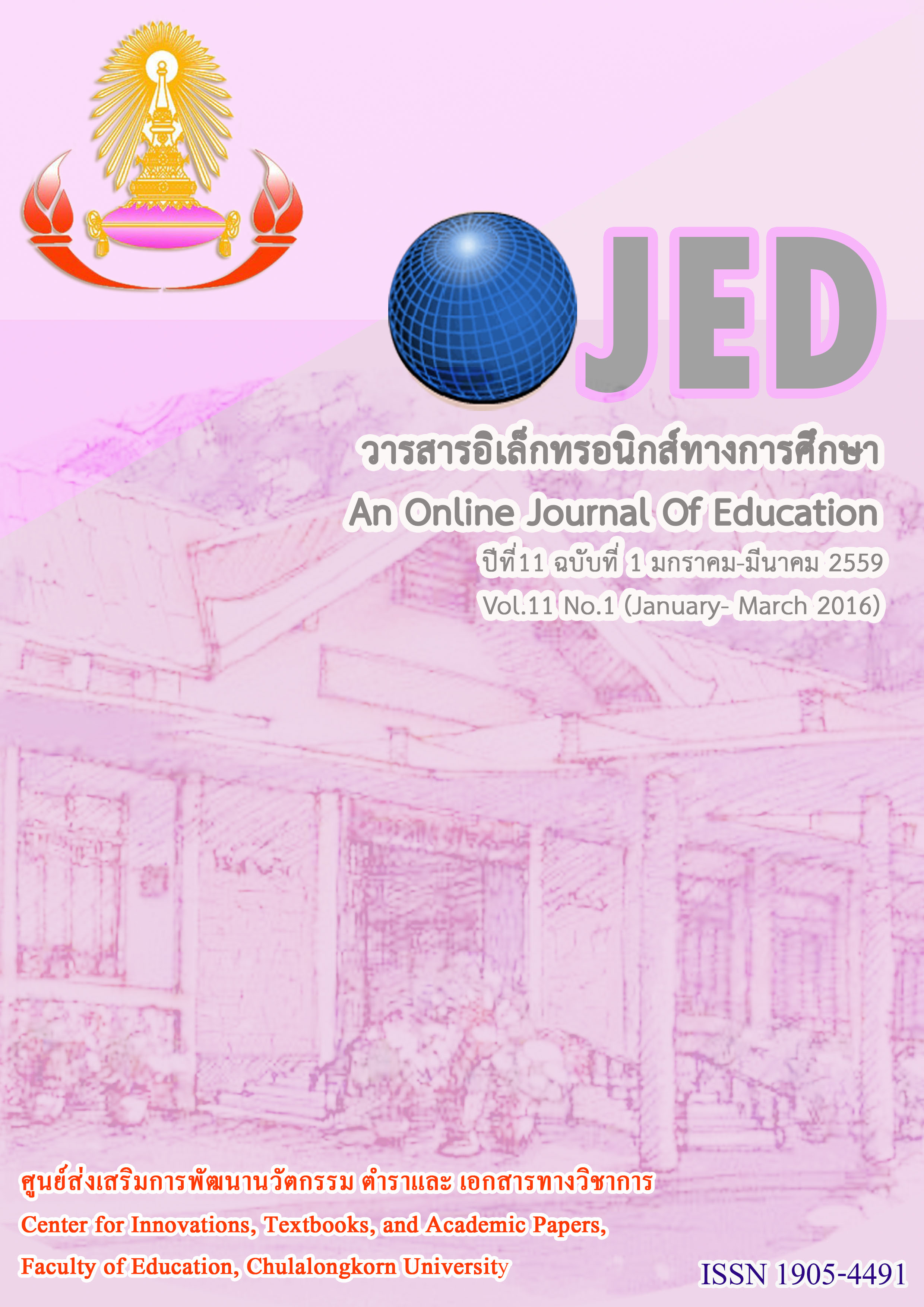ผลของกลวิธีการสอนทํานาย-อภิปราย-อธิบาย-สังเกต-อภิปราย-อธิบายที่มีต่อความเข้าใจมโนทัศน์และผลสัมฤทธิ์การเรียนรูเคมีของนักเรียนชั้นมัธยมศึกษาตอนปลาย EFFECTS OF THE PREDICT-DISCUSS-EXPLAIN-OBSERVE-DISCUSS-EXPLAIN TEACHING STRATEGY ON THE CHEMISTRY CONCEPTUA
คำสำคัญ:
กลวิธีการสอนทํานาย-อภิปราย-อธิบาย-สังเกต-อภิปราย-อธิบาย, ความเข้าใจมโนทัศน์เคมี, ผลสัมฤทธิ์การเรียนรู้เคมี, THE PREDICT-DISCUSS-EXPLAIN-OBSERVE-DISCUSS-EXPLAIN TEACHING STRATEGY, CHEMISTRY CONCEPTUAL UNDERSTANDING, CHEMISTRY LEARNING ACHIEVEMENTบทคัดย่อ
การวิจัยครั้งนี้เป็นการวิจัยเชิงทดลองเบื้องต้น มีวัตถุประสงค์เพื่อ 1) ศึกษาผลของกลวิธีการสอนทํานาย-อภิปราย-อธิบาย-สังเกต-อภิปราย-อธิบายที่มีต่อความเข้าใจมโนทัศน์เคมี 2) ศึกษาผลของกลวิธีการสอนทํานาย-อภิปราย-อธิบาย-สังเกต-อภิปราย-อธิบายที่มีต่อผลสัมฤทธิ์การเรียนรู้เคมี กลุ่มเป้าหมายในการวิจัย คือ นักเรียนระดับชั้นมัธยมศึกษาปีที่ 5 โรงเรียนมัธยมศึกษาขนาดใหญ่พิเศษสังกัดสำนักงานเขตพื้นที่การศึกษามัธยมศึกษากรุงเทพมหานคร เขต 1 ซึ่งศึกษาในภาคการศึกษาต้น ปีการศึกษา 2559 จำนวน 1 ห้องเรียน เครื่องมือที่ใช้ในการวิจัยครั้งนี้ คือ แบบวัดความเข้าใจมโนทัศน์เคมีจำนวน 3 ชุด โดยมีค่าความเที่ยงเท่ากับ 0.75 0.74 และ 0.71 ตามลำดับ และแบบสอบผลสัมฤทธิ์การเรียนรู้เคมีมีค่าความเที่ยงเท่ากับ 0.82 วิเคราะห์ข้อมูลด้วยสถิติค่าเฉลี่ย ค่าเฉลี่ยร้อยละ ส่วนเบี่ยงเบนมาตรฐาน และสถิติทดสอบที ประกอบกับการวิเคราะห์ข้อมูลเชิงคุณภาพ
ผลการวิจัยสรุปได้ดังนี้ 1) นักเรียนกลุ่มเป้าหมายมีคะแนนเฉลี่ยความเข้าใจมโนทัศน์เคมีหลังเรียนคิดเป็นร้อยละ 71.00 ซึ่งอยู่ในระดับดี และมีคะแนนเฉลี่ยความเข้าใจมโนทัศน์เคมีหลังเรียนสูงกว่าก่อนเรียนอย่างมีนัยสำคัญทางสถิติที่ระดับ .05 2) นักเรียนกลุ่มเป้าหมายมีคะแนนเฉลี่ยผลสัมฤทธิ์การเรียนรู้เคมีหลังเรียนคิดเป็นร้อยละ 70.07 ซึ่งอยู่ในระดับดี และมีคะแนนผลสัมฤทธิ์การเรียนรู้เคมีหลังเรียนสูงกว่าก่อนเรียนอย่างมีนัยสำคัญทางสถิติที่ระดับ .05 นอกจากนี้จากการสัมภาษณ์นักเรียนรายบุคคลพบว่านักเรียนแสดงความคิดเห็นเกี่ยวกับกลวิธีการสอนทำนาย-อภิปราย-อธิบาย-สังเกต-อภิปราย-อธิบาย ว่ากลวิธีการสอนดังกล่าวช่วยให้นักเรียนสามารถจดจำเนื้อหาที่เรียนได้ยาวนานขึ้น
This study was a pre-experimental research. The purposes of this study were to: 1) study conceptual understanding in chemistry after learning through the predict-discuss-explain-observe-discuss-explain teaching strategy, 2) study learning achievement in chemistry after learning through the predict-discuss-explain-observe-discuss-explain teaching strategy. The target group was one of the eleventh grade classes at an extraordinary school in the secondary educational service area office 1 in the first semester of academic year 2016. The research instruments were three chemistry conceptual understanding tests with reliability at 0.75 0.74 and 0.71 respectively and the chemistry learning achievement test tests with reliability at 0.82. The collected data were analyzed by arithmetic mean, means of percentage, standard deviation, t-test and qualitative analysis.
The research findings were as follows: (1) the mean score of the target group in chemistry conceptual understanding was 71.00 percent which was at the good level and higher than before the experiment at a .05 level of significance. (2) The mean score of the target group in chemistry learning achievement was 70.04 percent which was at the good level and higher than before the experiment at a .05 level of significance. In addition, the qualitative analysis from interviewing individual students revealed that the predict-discuss-explain-observe-discuss-explain teaching strategy can promote long-term memory among students.




